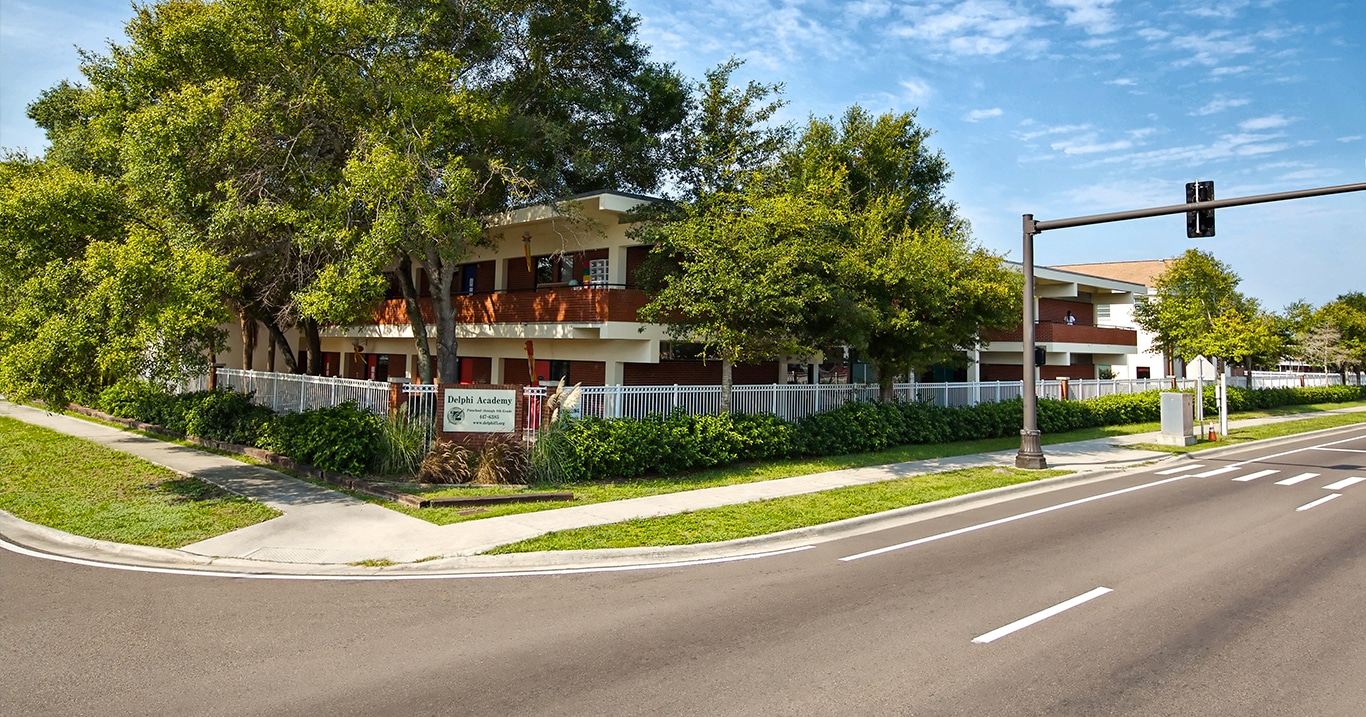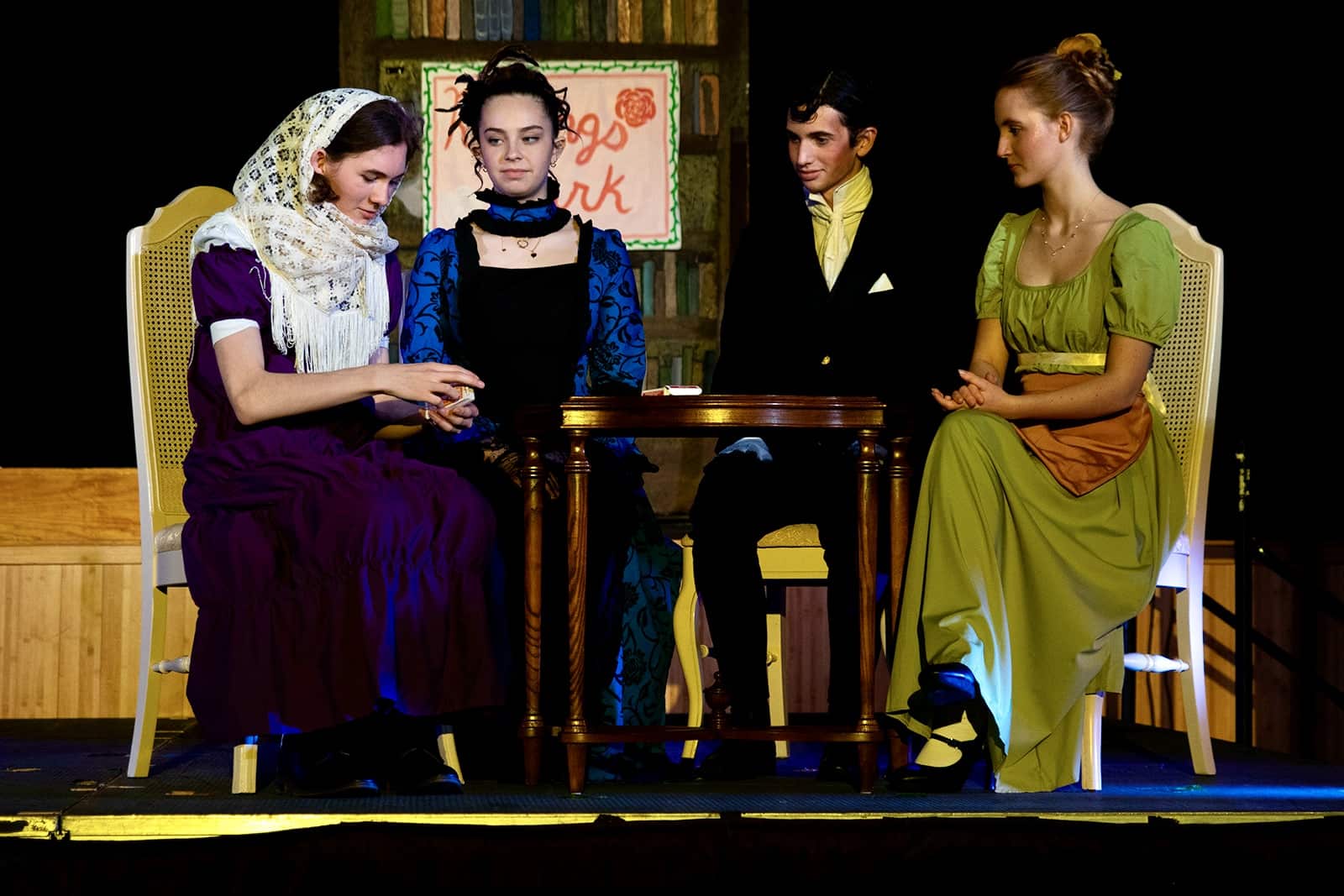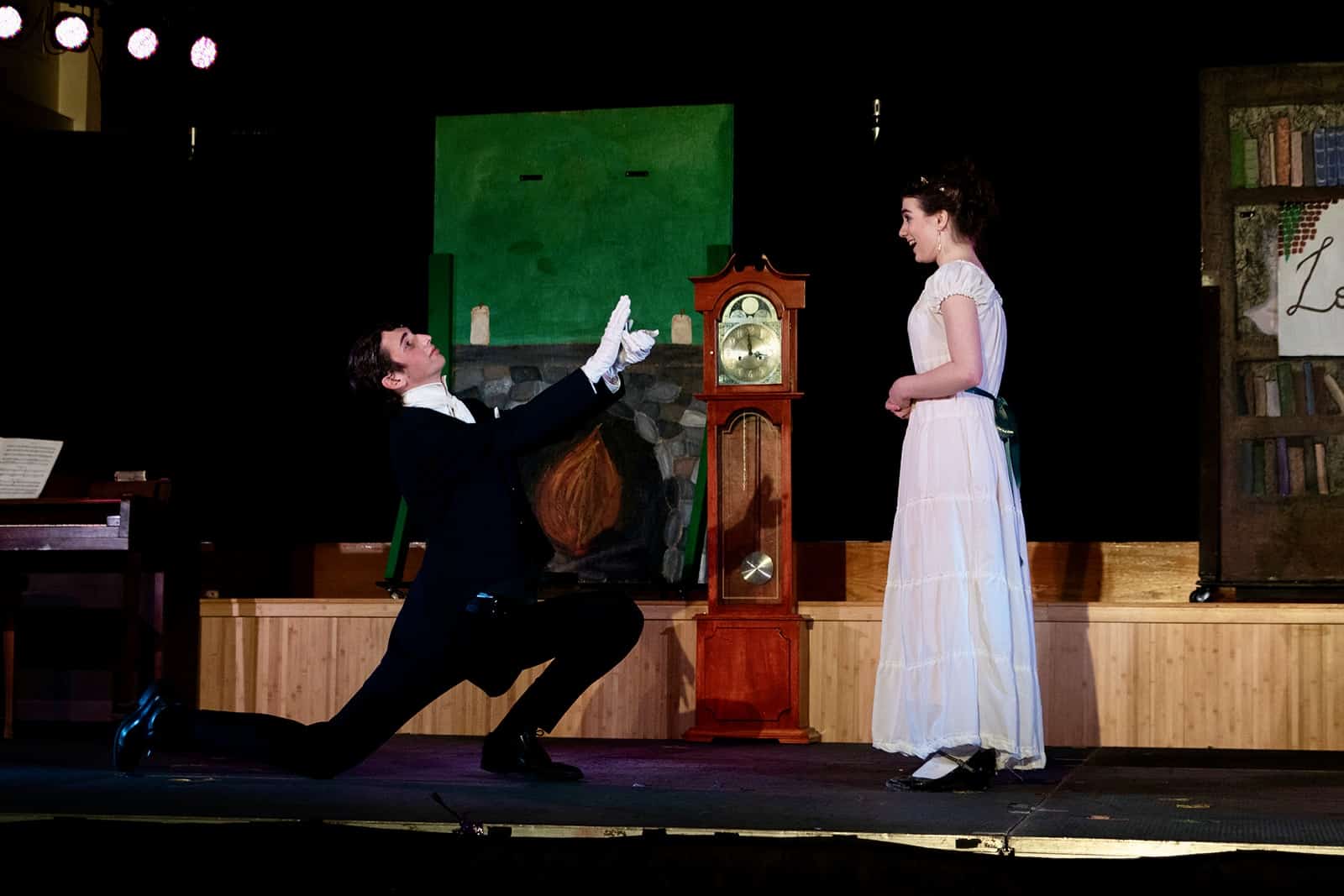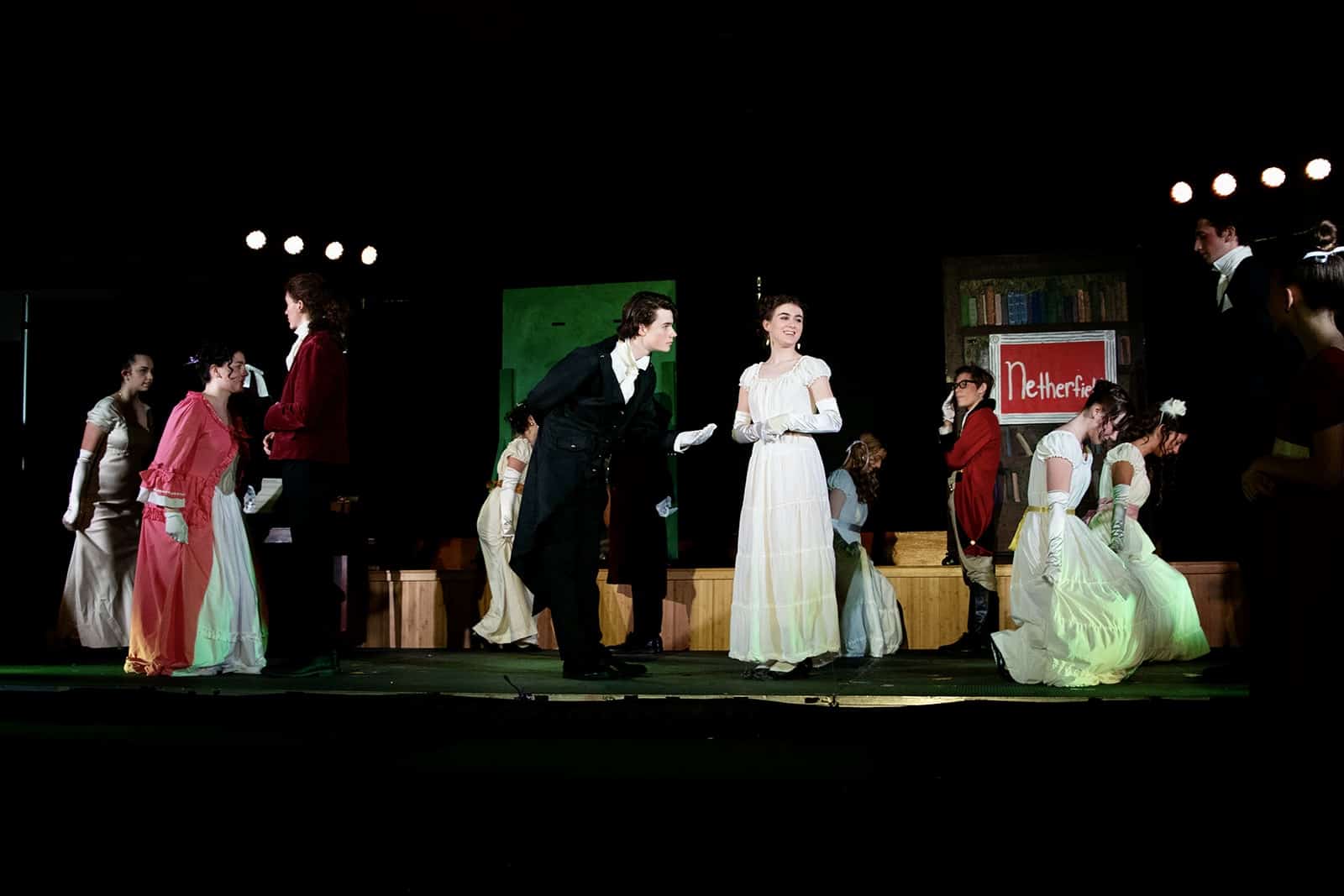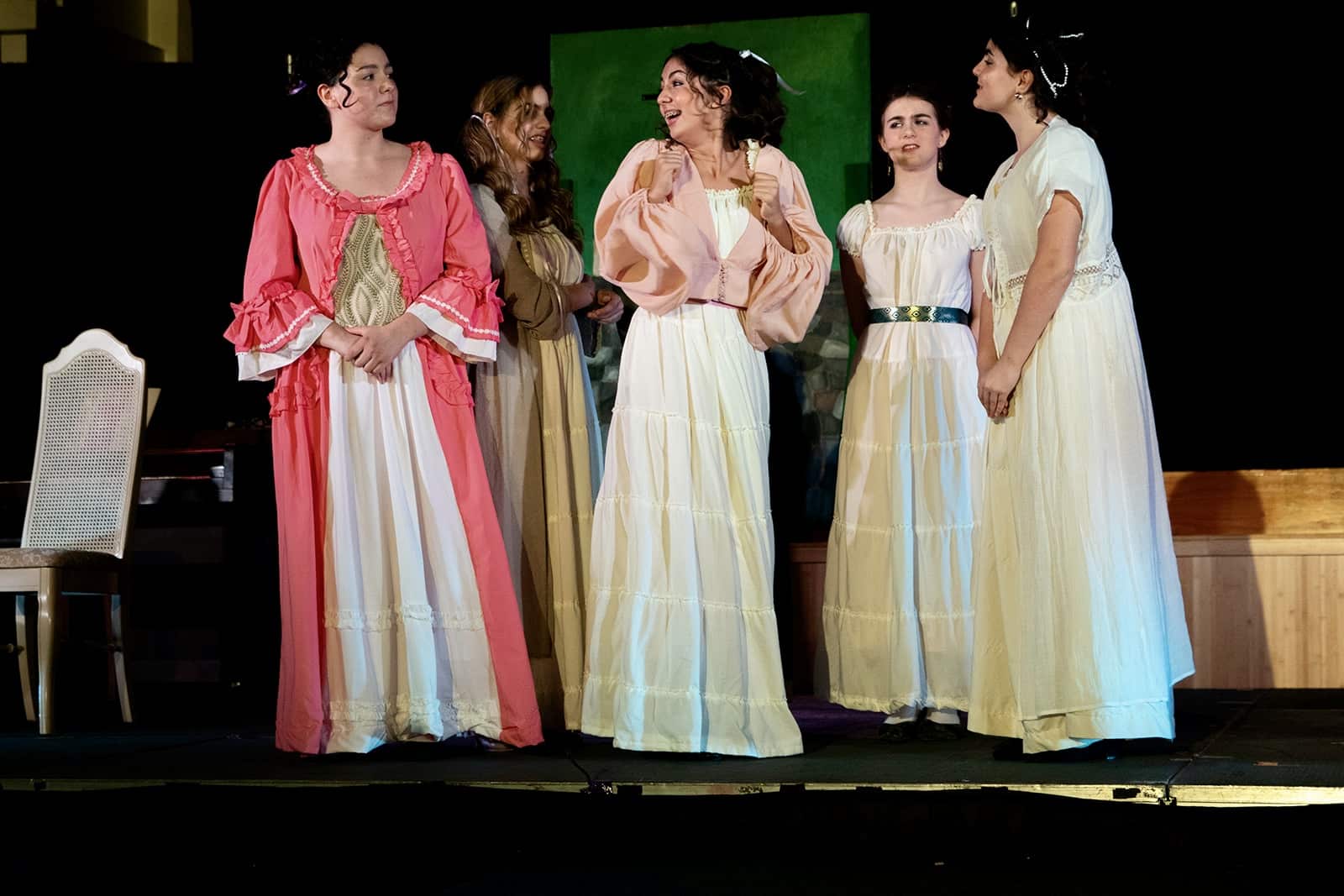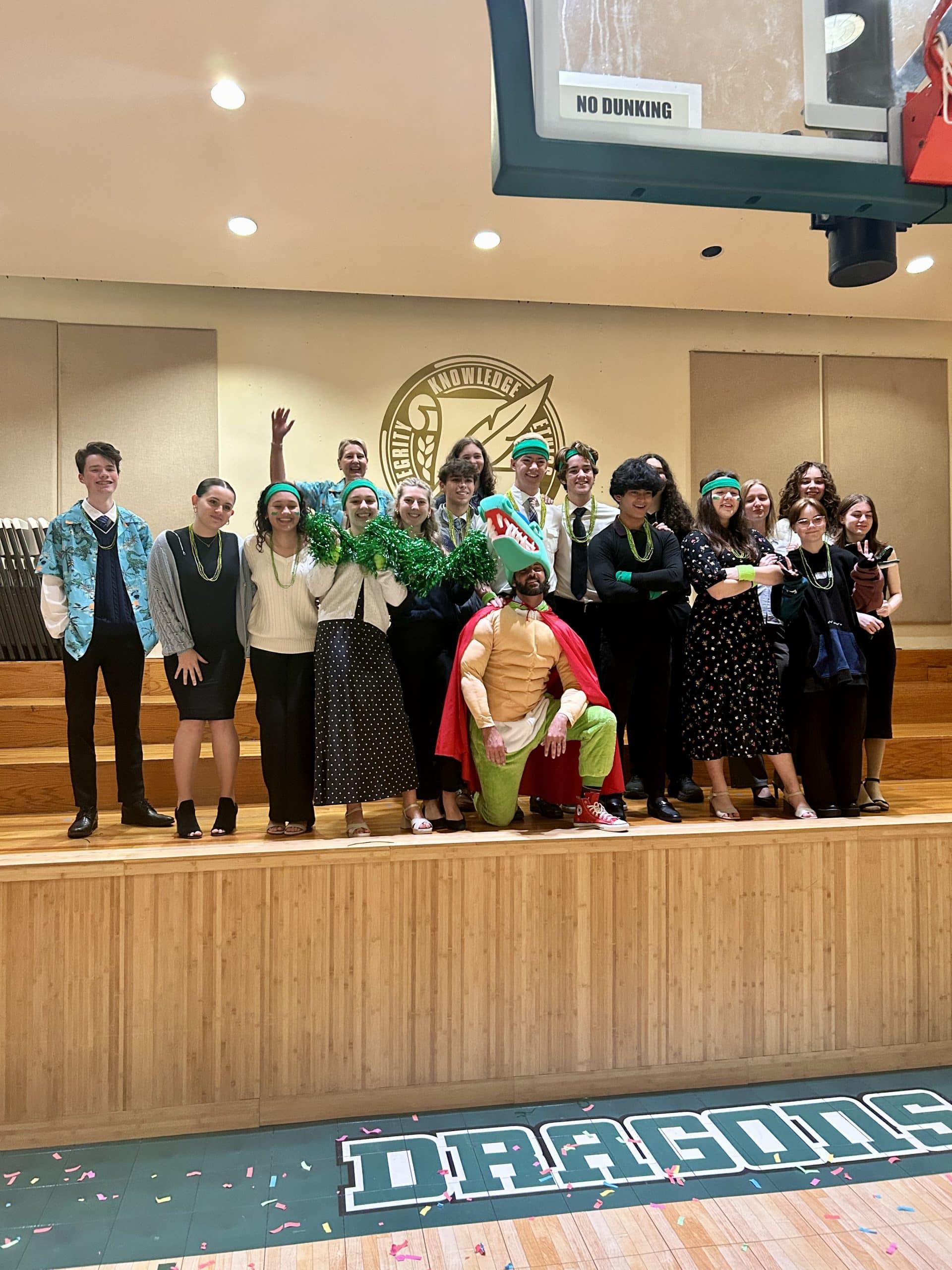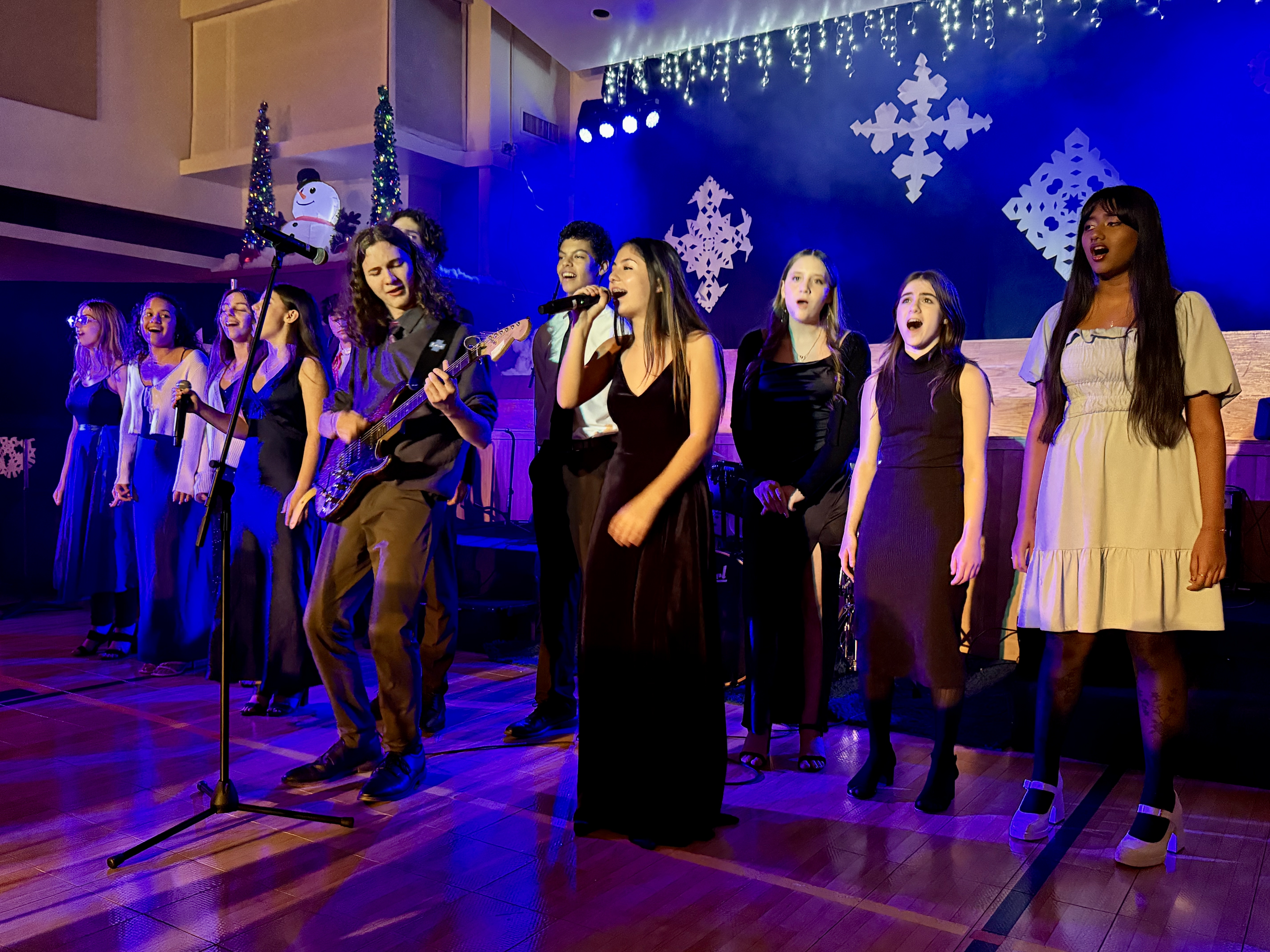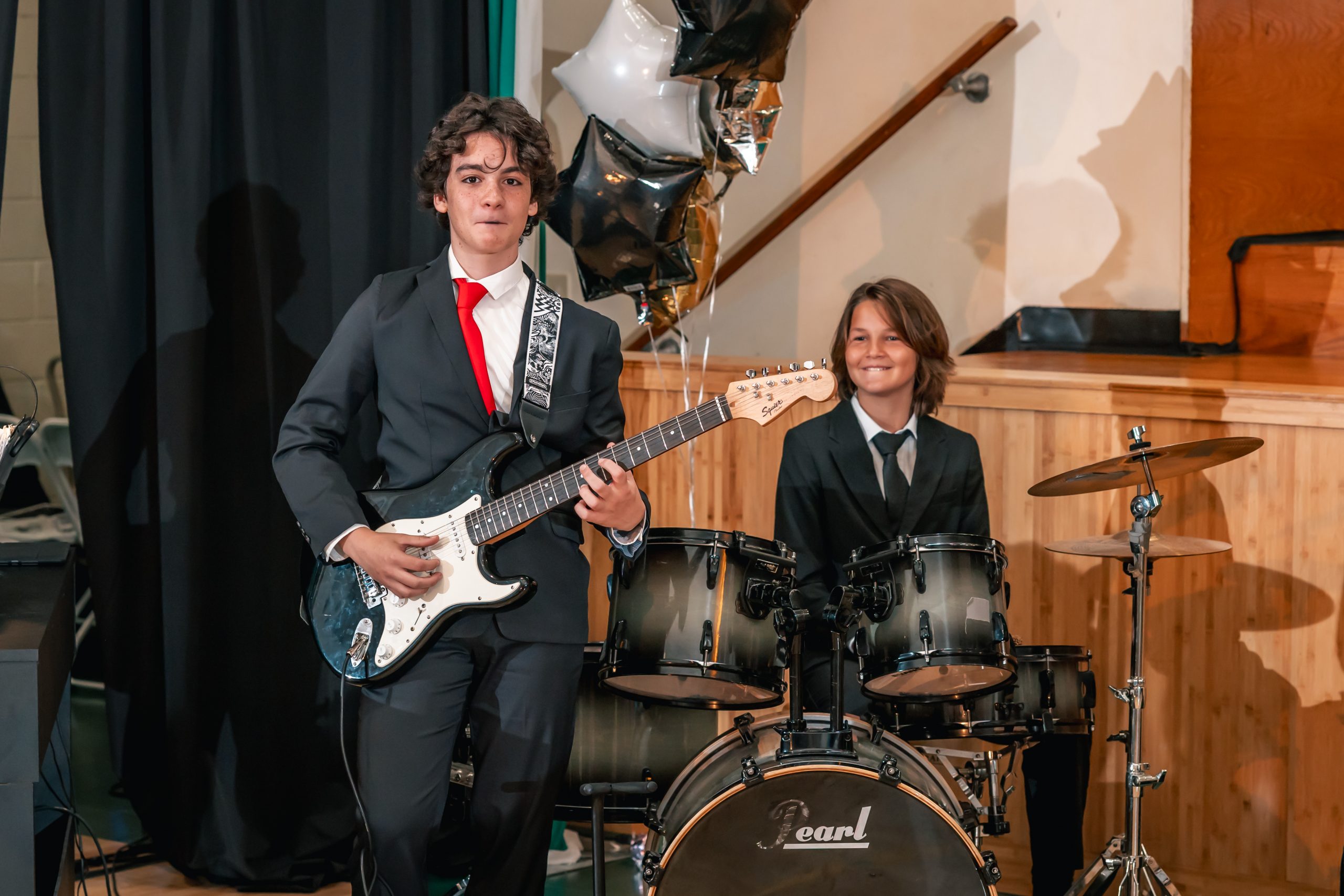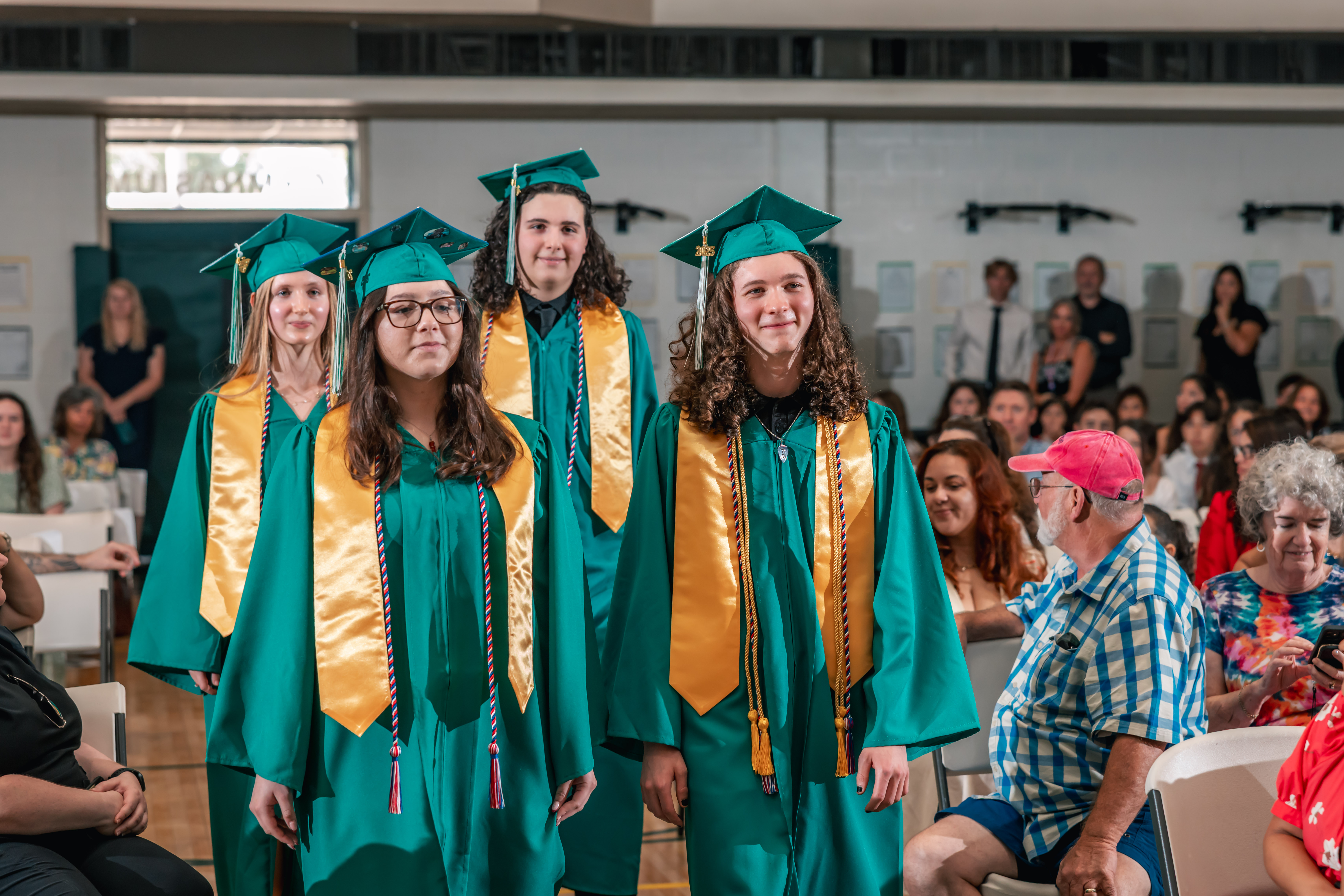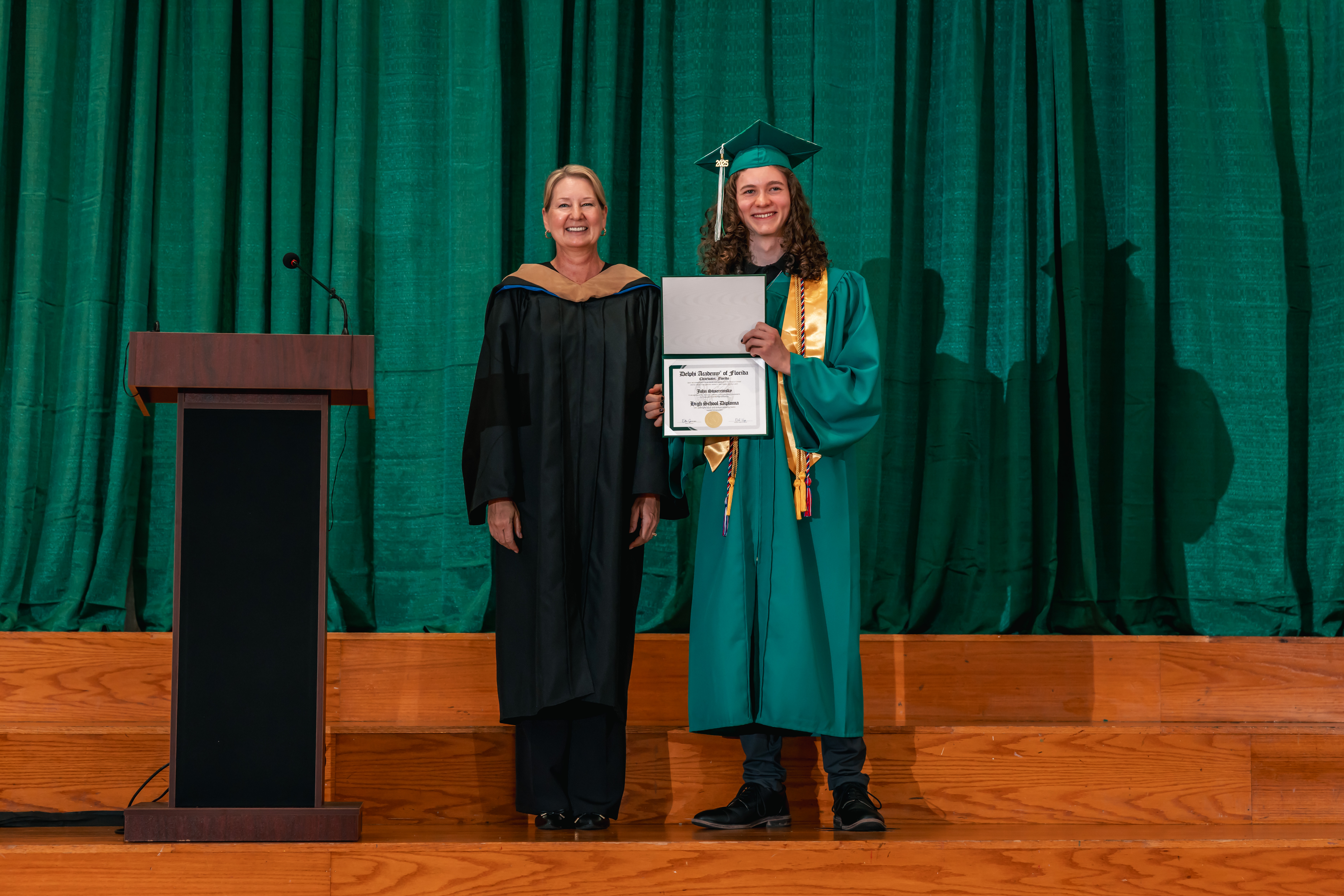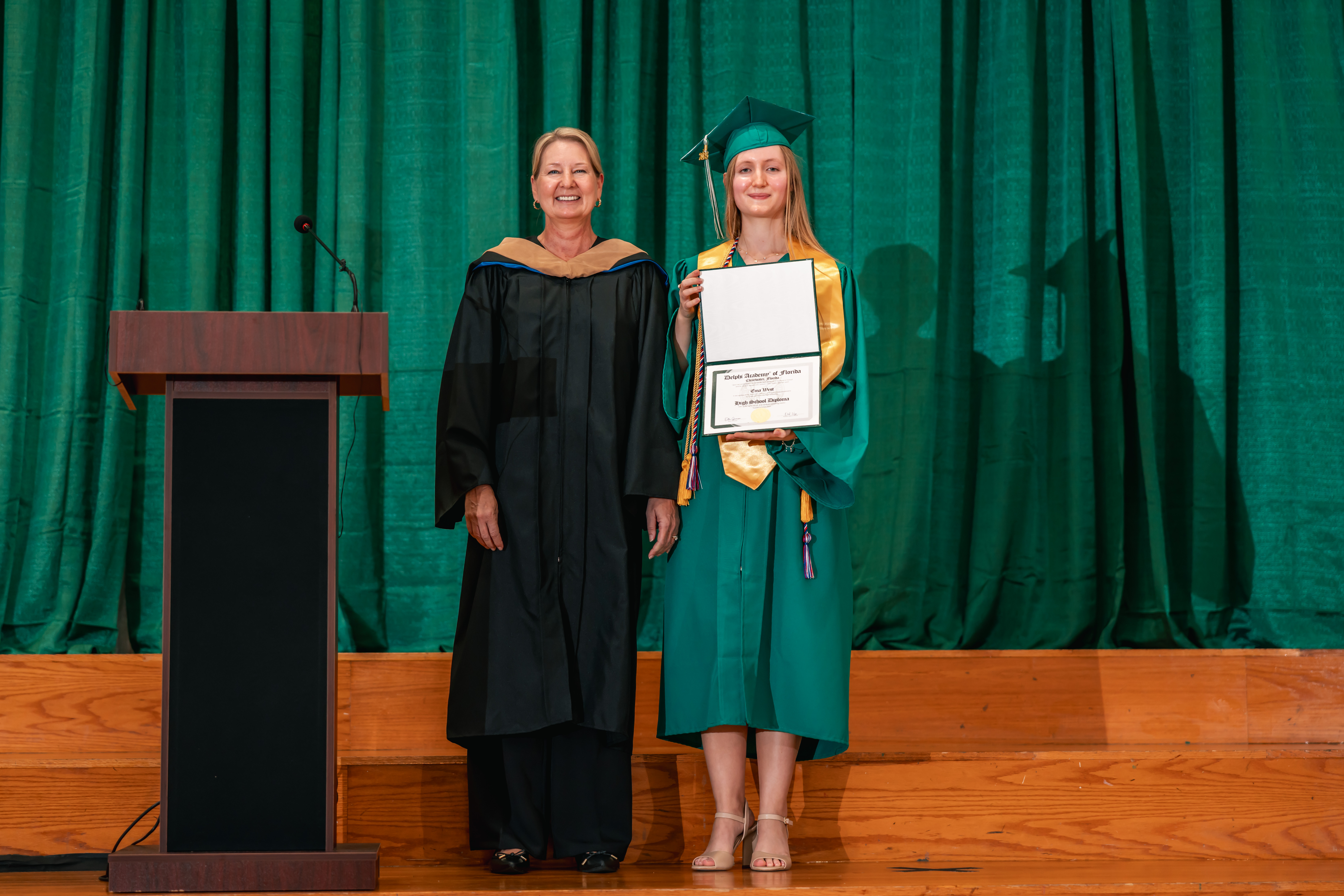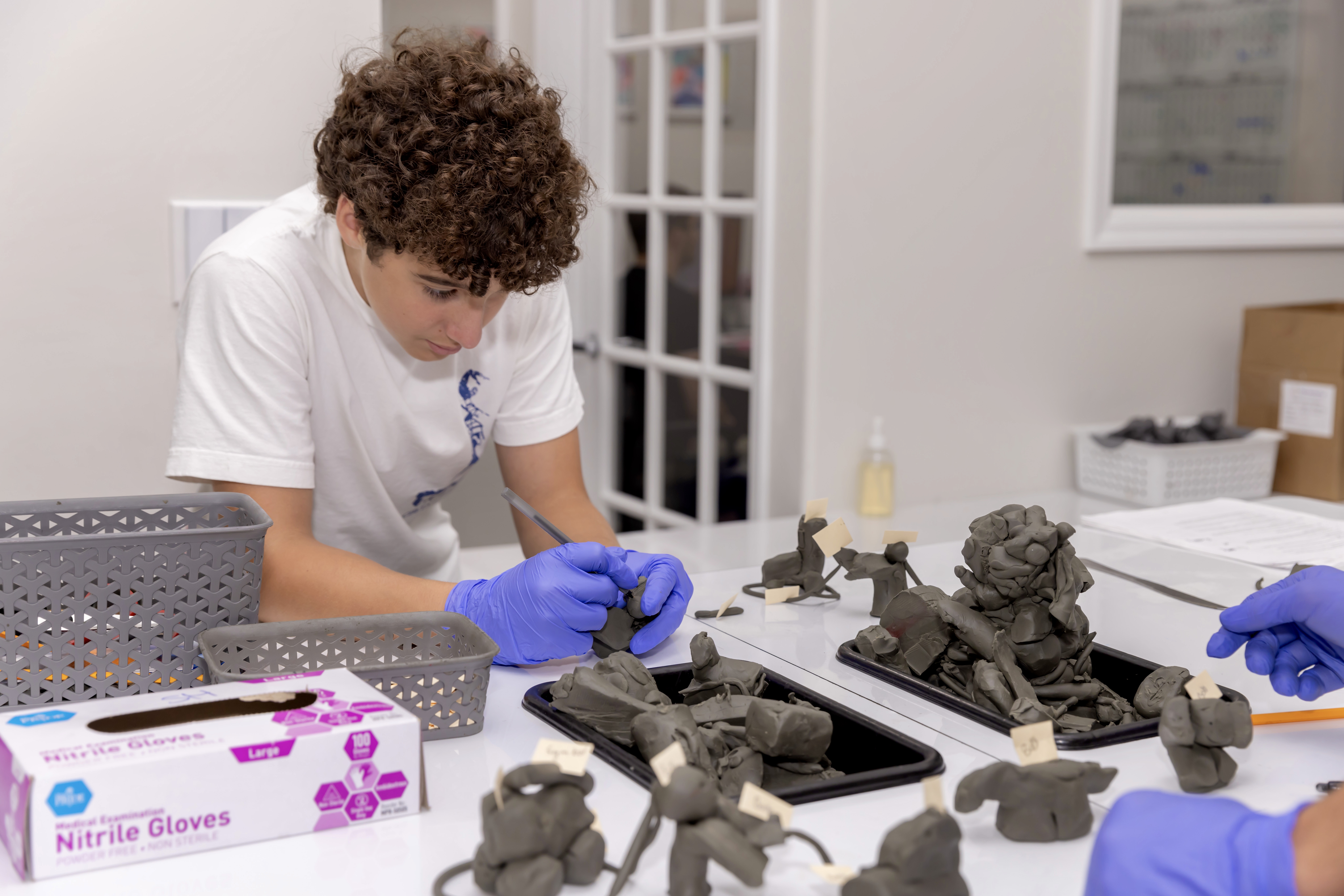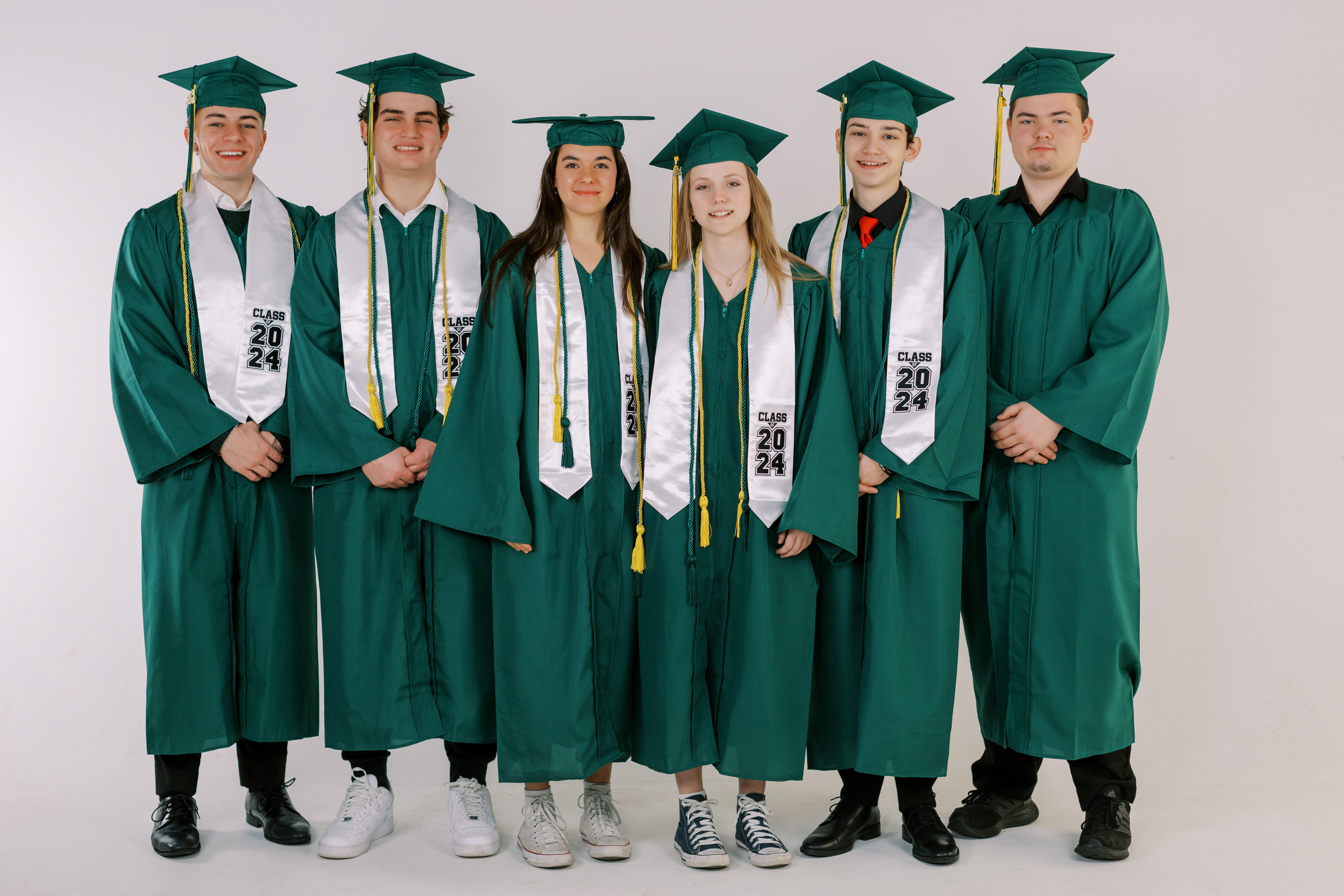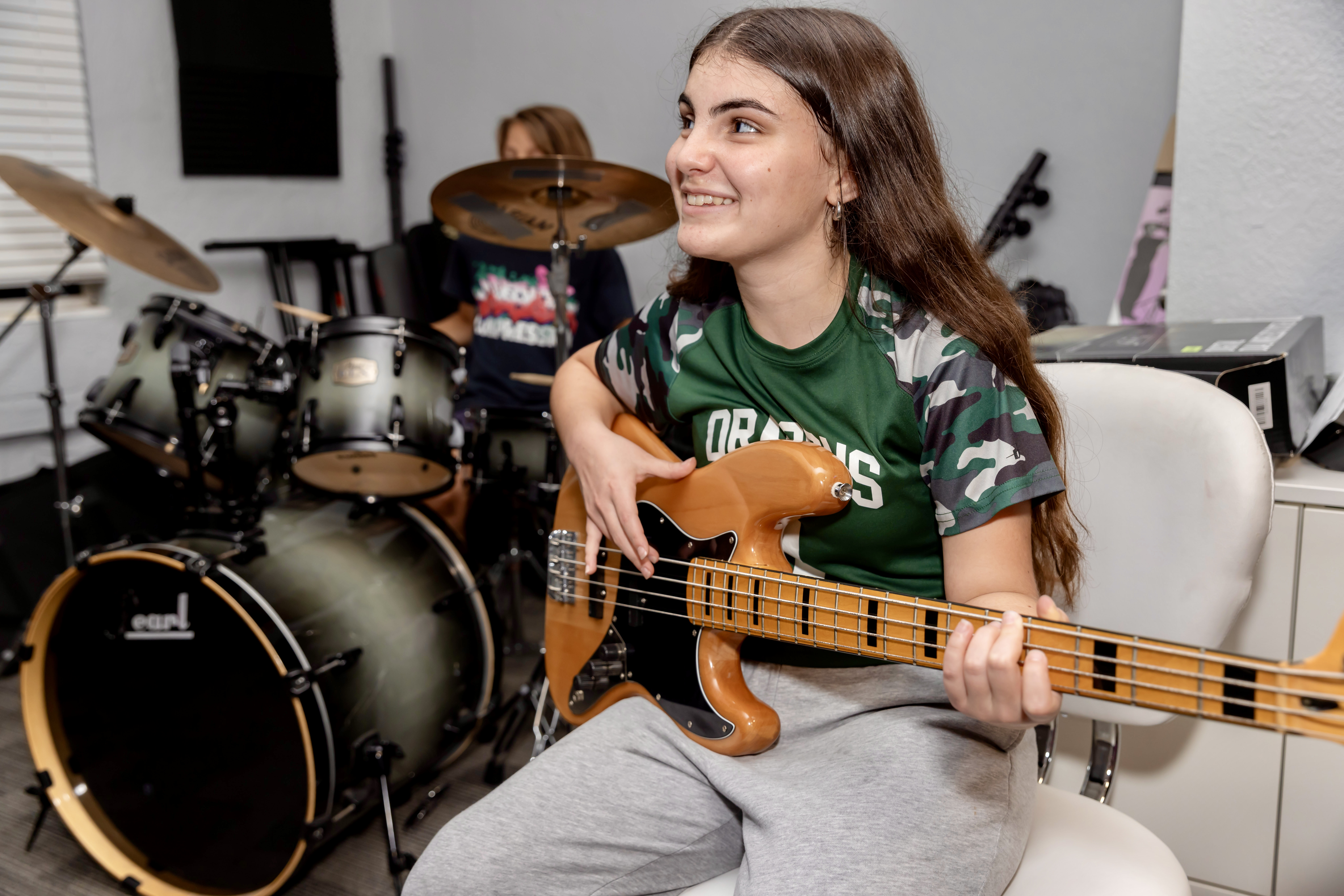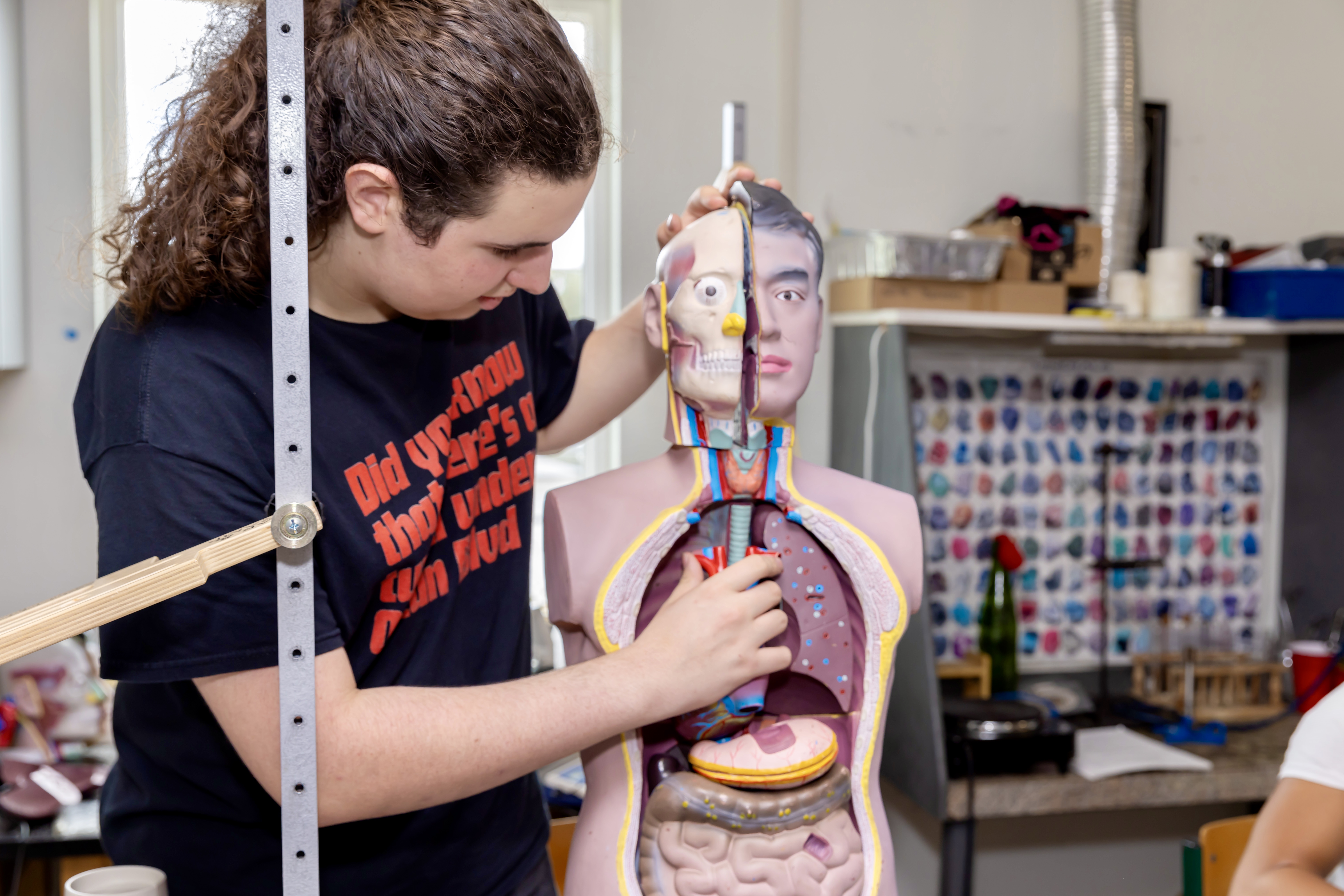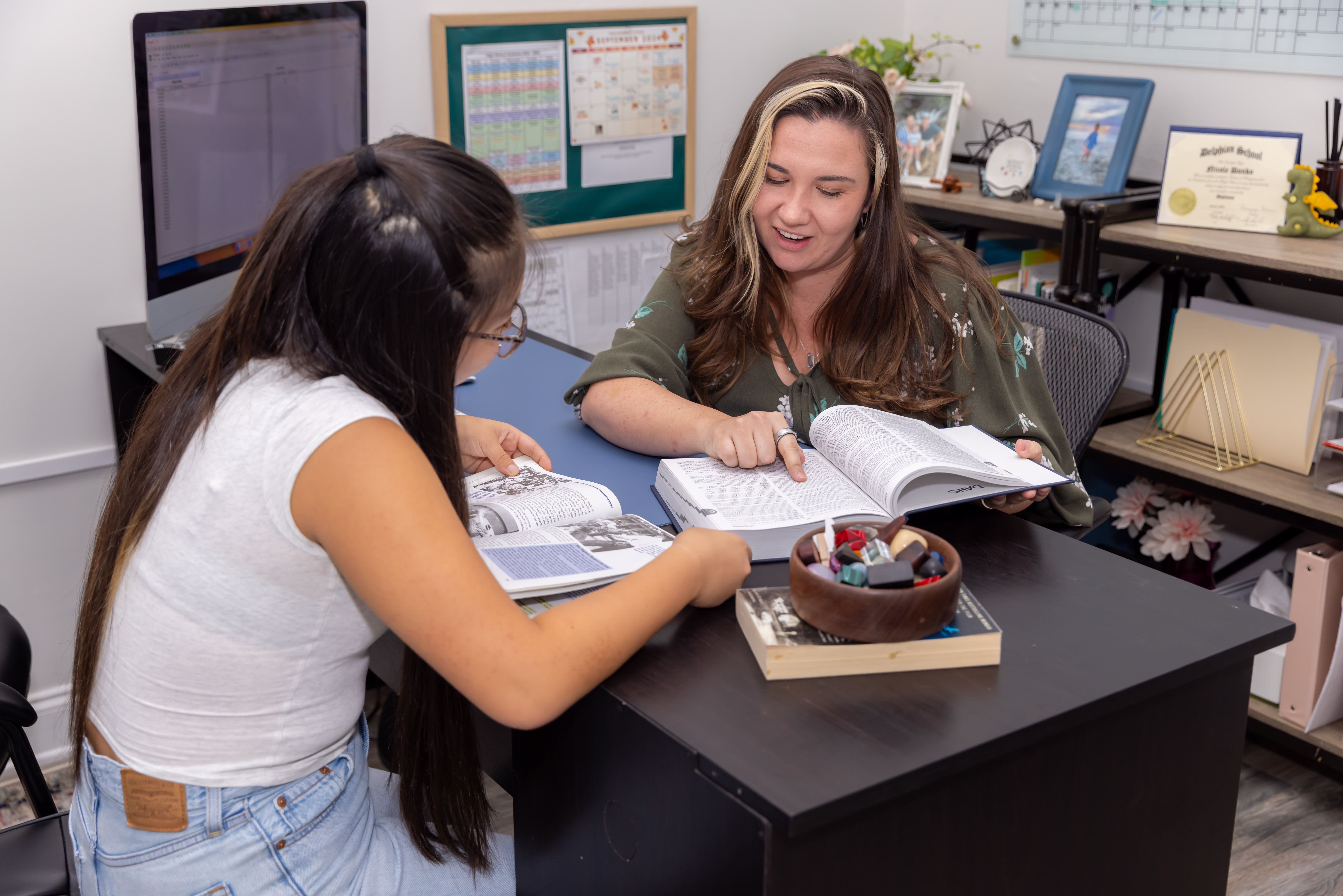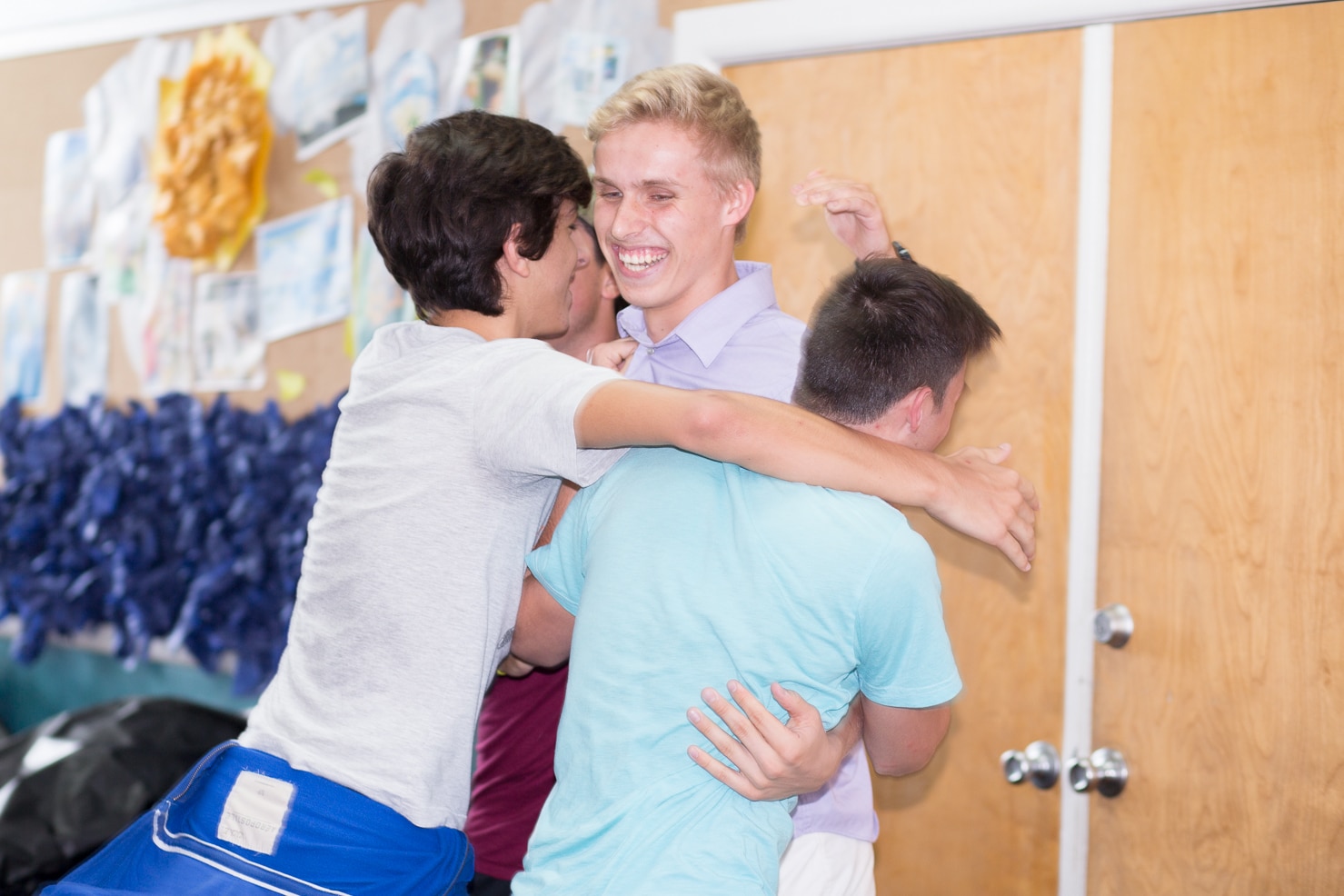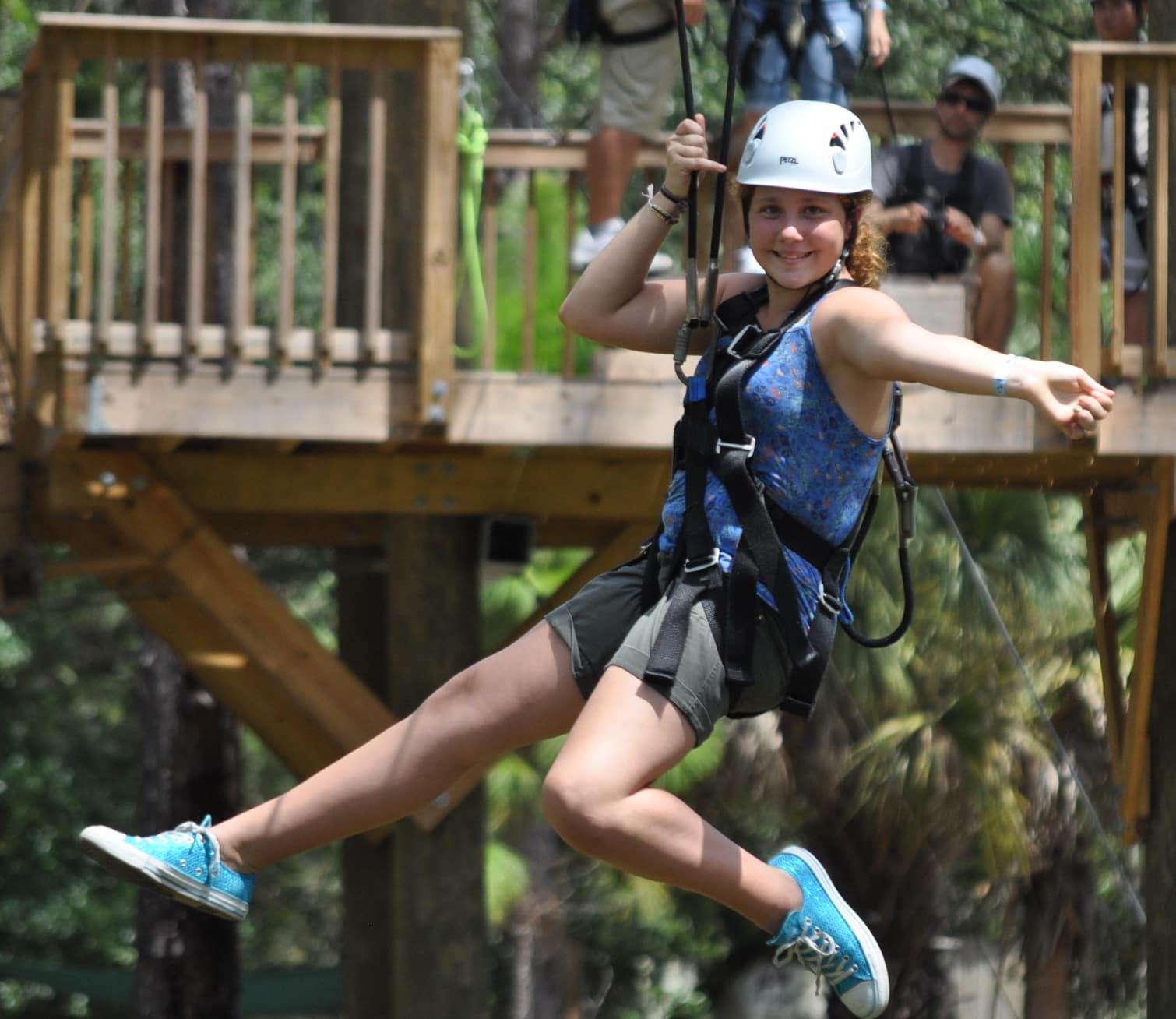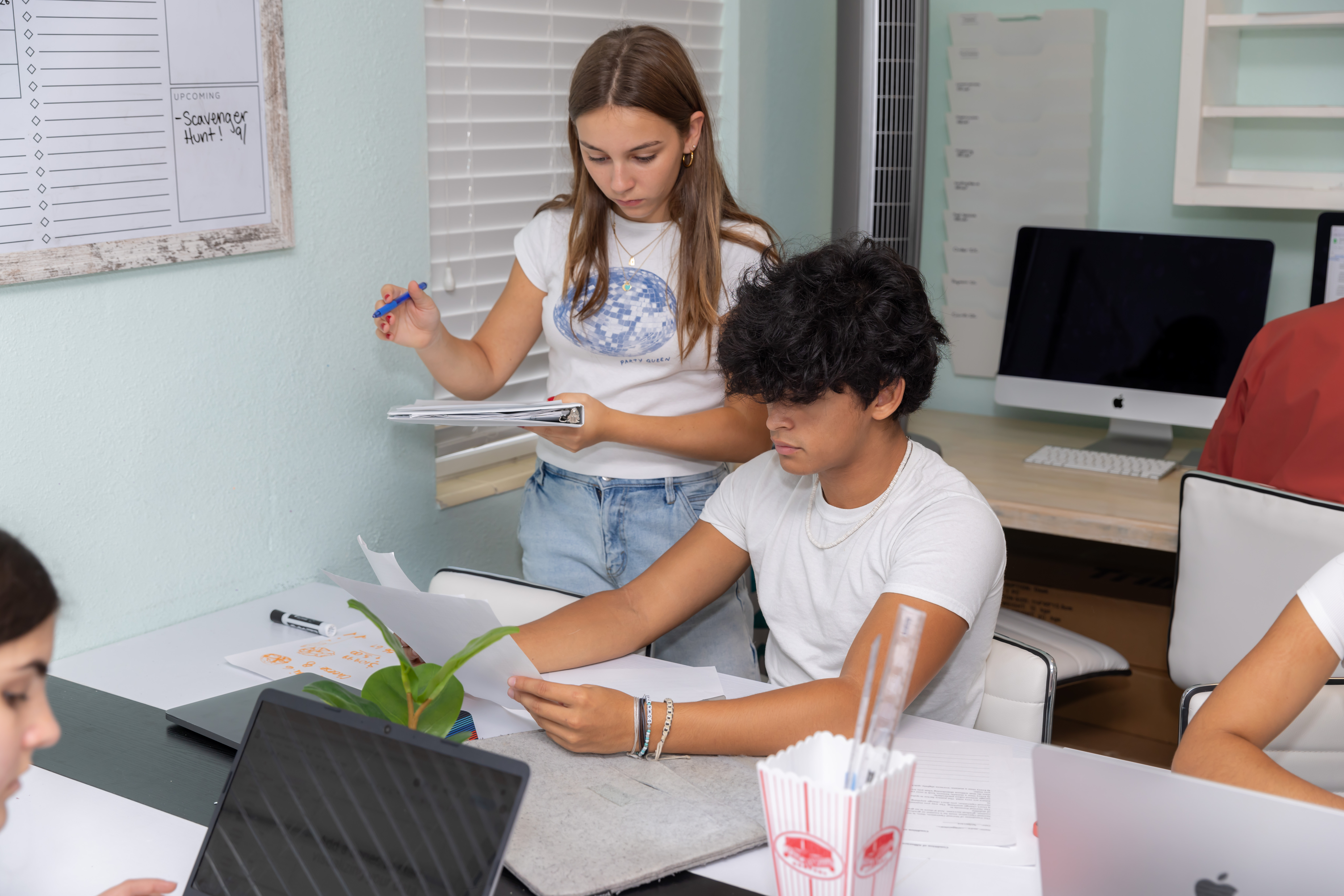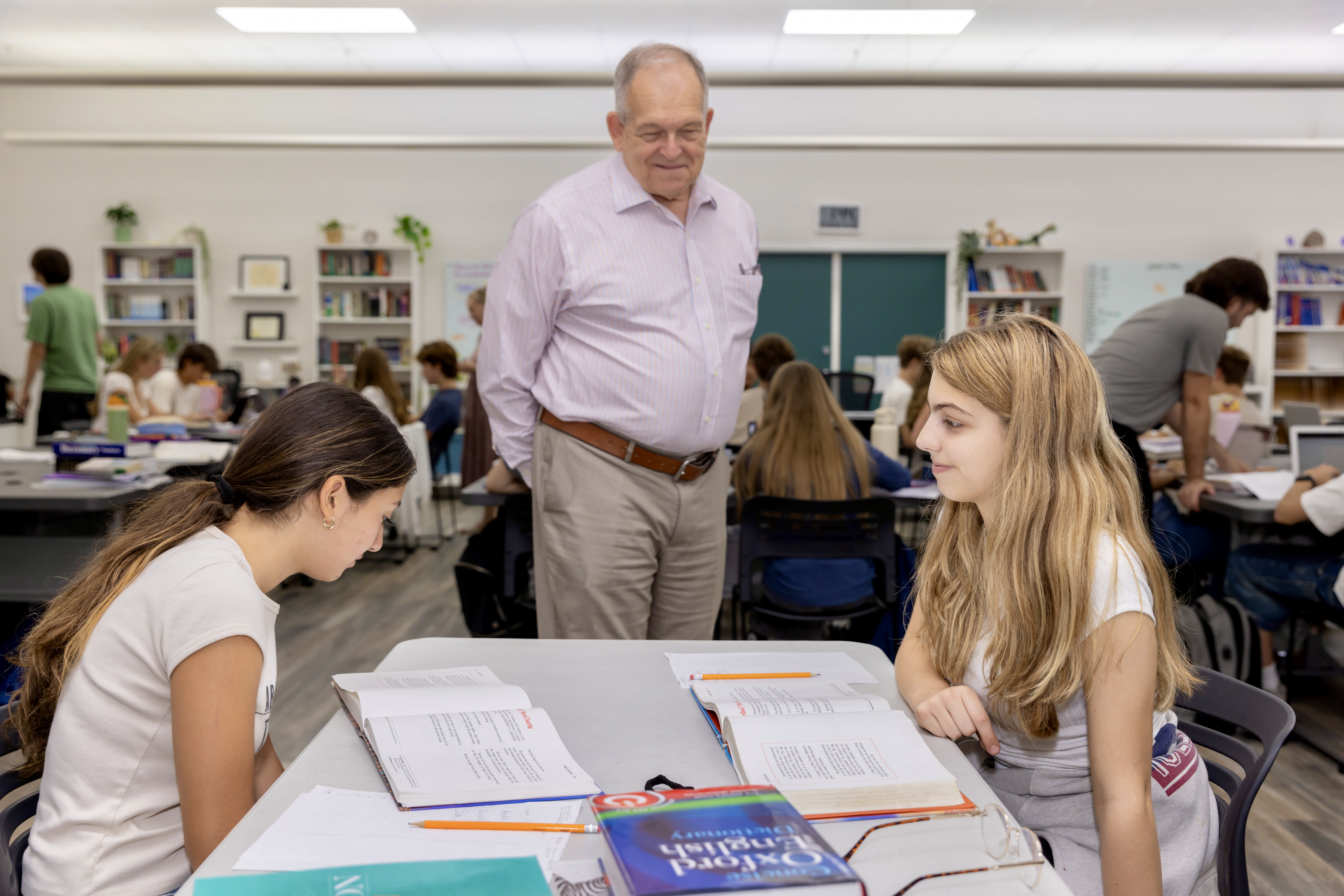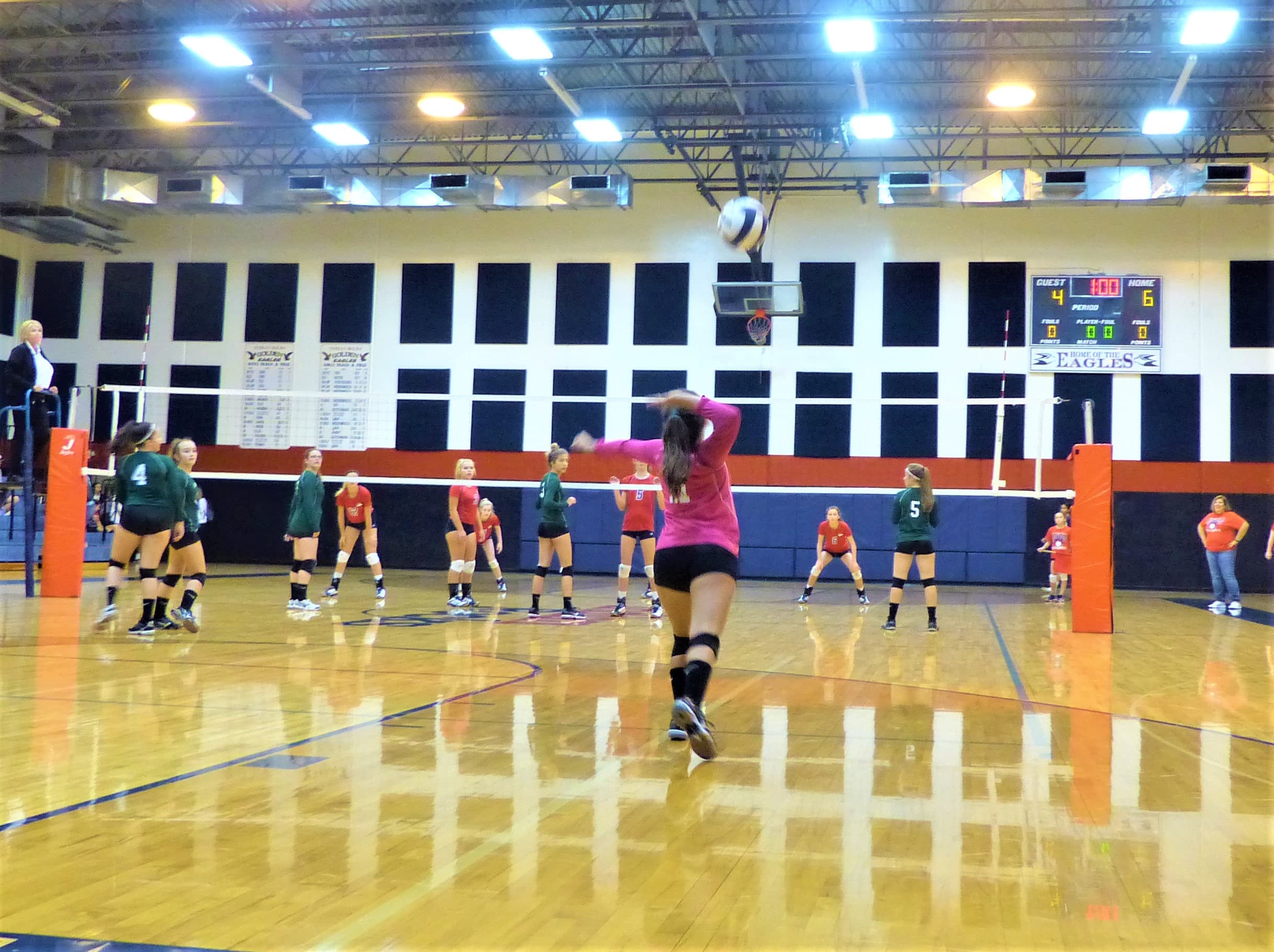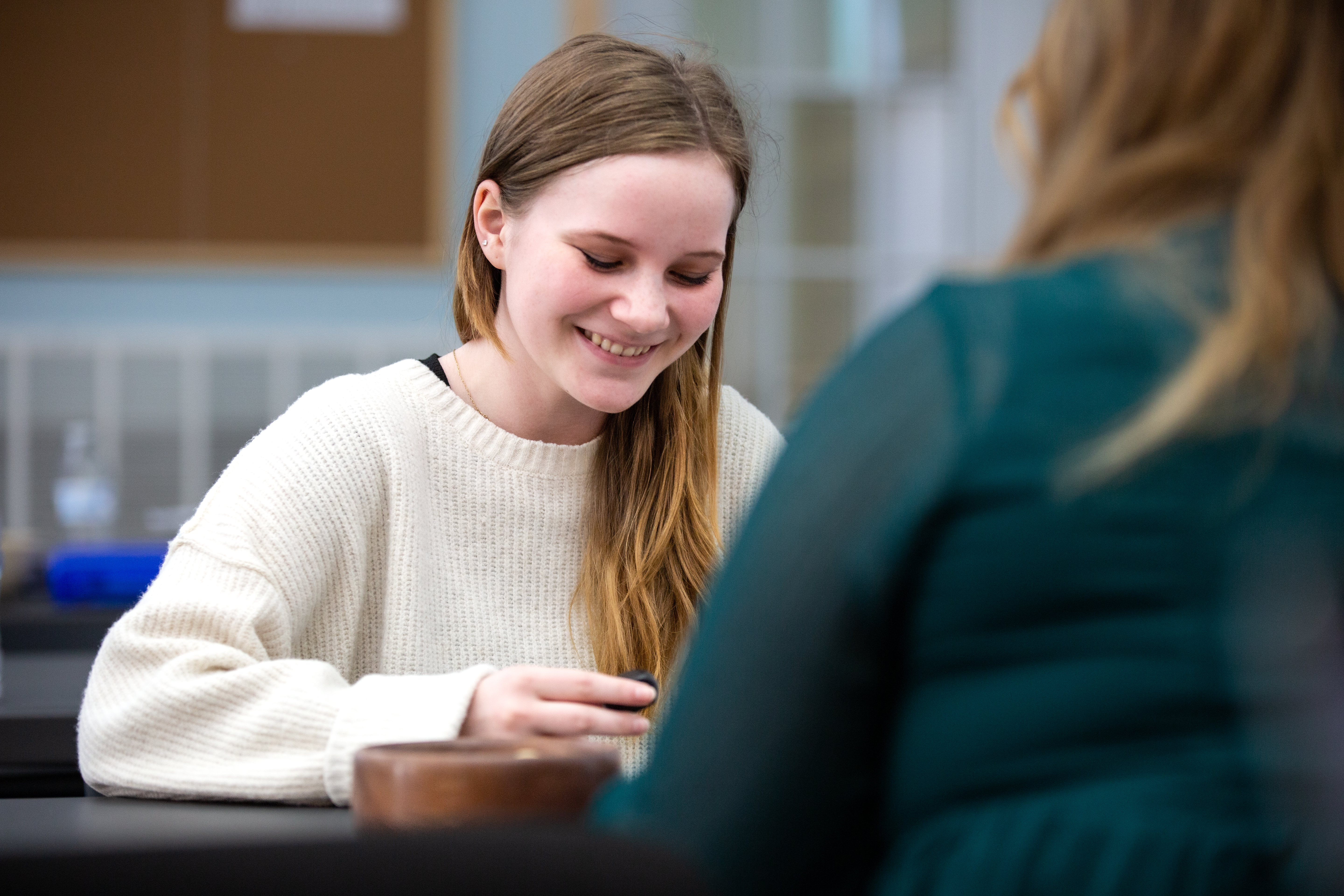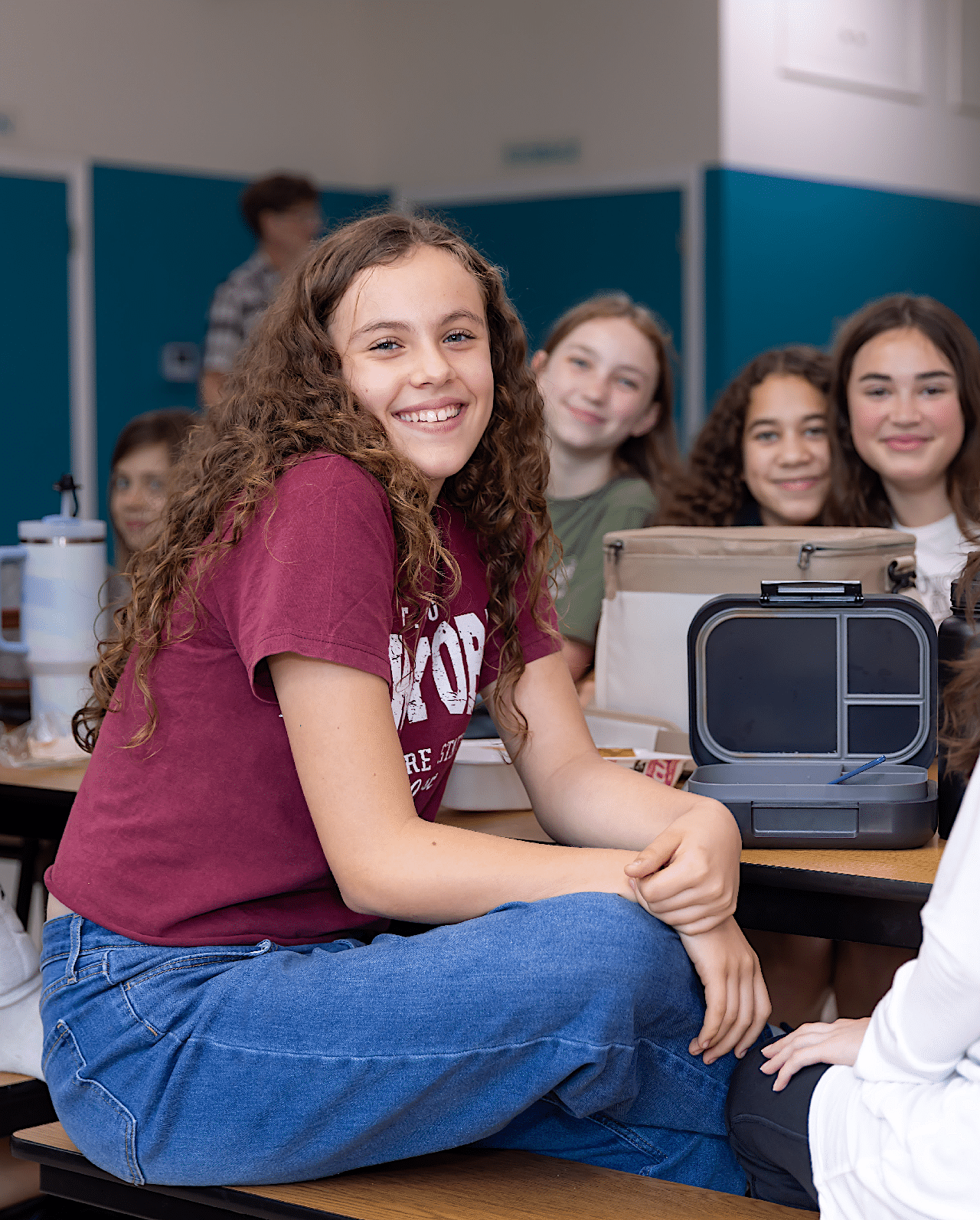Delphi Academy of Florida High School Program
We believe that the end goal of an education is to prepare young people with the skills and tools needed to become independent, capable adults who can act with integrity and judgment in the pursuit of their goals and dreams.
Rather than teach to the group, here at Delphi Academy High School, we focus on independent, self-paced study. Each student’s academic program is personalized for their strengths, weaknesses and interests. High School students work with their teachers to create a customized “program” – a list of courses they will study on their educational journey to achieving the abilities we expect from each student, as laid out in our graduation requirements. Our teachers are there to catch when our students stumble and guide them through their personal academic journey. Each student must complete at least 24 credits to graduate:
- English/Language Arts – Each student must complete 4 ELA credits. We have an incredibly robust literature program, along with a variety of course options available for English and composition.
- Mathematics – Each student must complete 4 math credits. All students complete courses in algebra 1, algebra 2, and Euclidean geometry. Students have a variety of choices for additional math credits including precalculus and calculus, with many of our students choosing financial mathematics.
- Laboratory Sciences – Each student must complete 3 science credits. All students complete laboratory courses in physics, chemistry and biology. We offer additional science courses in a variety of subjects including computer science.
- Social Studies – Each student must complete 3.5 social studies credits. All students complete courses in American history, American government, world history, and economics. We offer additional social studies in a large variety of subjects including philosophy, legal systems and life skills.
- Foreign Language – At this time we only offer 2 credits of Spanish instruction, but students are able to take on other foreign languages via an approved independent study course.
- Electives – Each student must complete 8 elective credits. This must include 1 credit of assorted arts, 1 credit of physical education.
Our purpose is to help students master their academics and gain the skills and abilities they need to go anywhere. We are happy to have developed multiple paths for students to take to graduation. The Delphi High School is a rich program that allows each student to find their path to their desired future. Once our students reach their Junior year, they can elect to follow a career interest path into:
- Business & Entrepreneurship – When taking the Business & Entrepreneurship path they will do courses like The Groups & Organization Handbook, teaching them to establish, organize, and financially manage within any organization.
- STEM – They can also elect our STEM path, where they focus on Advanced Physics, Chemistry and mathematics.
- Trade professions – We are excited to have a Trades path where students can gear their High School degree towards their interest in becoming an Electrician, Baker or Machinist, just for example.
Core Concepts
Application
The founding concept of our program is to encourage students to use the subject they are learning, while they are learning it.
The ability to use what one is learning in real life gives students the confidence and freedom to build a limitless future for themselves. Practical application can include conducting experiments, participating in activities, and completing a variety of hands-on projects. Rather than learn just from teachers, our students learn from our curriculum and the world around them as well, with practical application of the subject they are studying.
Students Take The Lead – Individualized Academic Programs
Each students personalized program includes all the steps needed to achieve the graduation requirements, while taking the students interests, goals, strengths and weaknesses into account. Each students program includes multiple projects to help them connect their studies to the word around them.
The Delphi Schools developed its curriculum with student independence as a primary goal. We believe that with the right study tools, students can be their own best teachers, learning at their own best pace. We have found the only reason students fail to learn is because they have never been taught how to learn. Every Delphi student is taught how to successfully learn any subject independently.
Our teachers, called academic supervisors are extensively trained in L. Ron Hubbard’s education philosophy and Study Technology. Academic Supervisors serve as expert guides, there to emphasize purpose, interest and comprehension as well as assist, support and encourage student success. They ensure students are learning at their optimum pace on their program. This approach allows students to learn for themselves how each subject can be useful in their life, helps them master critical thinking skills, and empowers them to be successful in their future endeavors.
Competency-Based Nature of the Program
At Delphi, we do not run on a year-by-year grade-level basis. Instead each student moves through their own individualized program at their own optimum pace, taking more time when needed and moving more rapidly whenever possible.
In many schools utilizing the grade levels system, children move through their materials based on time rather than understanding. This model leaves many children stranded with educational holes. Delphi’s approach is just the opposite, where learning is the constant and time is the variable as students work towards achieving our graduation requirements.
The curriculum encourages students to apply the knowledge they’re gaining to real life situations, building critical thinking and problem-solving skills, rather than emphasizing memorization of facts or time spent in class. Students are required to demonstrate proficiency in each course of study before moving on to the next course or subject. This is done in our separate Student Examinations area, where all testing is done on an individual basis. At the high school level, all tests are written in cursive, or typed when given permission by the examiner. We do not offer multiple choice questions, instead we use a combination of short answer and long answer essay questions, as well as problem solving on math and science based exams.
After a test is given, we review with the student on any questions, problems, or concepts that were missed. If a student received below an 85%, we will do a more in depth restudy program. If a student receives less than 60% they are required to retake their course in its entirety. All tests are graded via percentage, which is then translated to a letter grade on their transcript. All students receive progress report cards from all of their teachers and instructors each semester.
This allows us to recognize each student as an individual, with the right to reason, to think creatively, to look at the world independently and to evaluate information for its relative importance and usefulness.
The Curriculum
Literature
The purpose of Delphian’s rich literature program is to provide students with exposure to a wide range of literary works, broadening their views and their understanding of the world’s cultures and civilizations.
Each level of the reading program builds upon the earlier level, encompassing a wide array of subjects including philosophy, art, history, biography and science. Students read a list of 5-10 required books per year depending on the level, some examples are Diary of a Young Girl by Anne Frank, and The Good Earth by Pearl S. Buck on Freshman level, White Fang by Jack London and Animal Farm by George Orwell on Sophomore, To Kill a Mockingbird by Harper Lee and Great Expectations by Charles Dickens on Junior Level, and Atlas Shrugged by Ayn Rand and Nineteen Eighty-Four by George Orwell on Senior Level. On each level, students also have a wide variety of elective books to choose from in order to meet their elective reading requirements, which is usually at least another 3-5 books. Students will typically read anywhere from 35-45 books during their time in High School.
Accompanying writing assignments are specifically designed to have no “right or wrong” answer; instead students are challenged to evaluate and develop their own ideas and viewpoints compared against the historical, social and political period, and discuss them rationally and logically, supported by their own understanding of the book, personal experiences and research.
Mathematics & Technology
Fundamentals in High School mathematics are the focus here along with a stress on the usability of the subject data in real-world applications.
Algebra – Algebra I is the initial level of mathematics required in High School. (A firm foundation in pre-algebra is required and remedial study is done prior to Algebra I if needed.) Students will not only gain a thorough understanding of basic algebraic concepts and nomenclature but will become adept at practical application of these concepts in a variety of settings.
Algebra II allows students to gain a more advanced understanding of algebraic concepts and applications, including more complex systems of linear equations and inequalities, quadratic equations, translation between functions of conic sections and their graphs, complex numbers, exponential and logarithmic functions, rational algebraic functions and irrational algebraic functions.
Geometry – Geometry covers both plane and solid geometry, with an emphasis on an ability to use the data to solve real-world situations and problems. Students address the nomenclature, measurements of area and volume of 2D and 3D shapes, construction, proofs of fundamental principles, three-view drawings and calculating curved surfaces.
Advanced Math – Students interested in pursuing a career in any of the STEM fields are encouraged to enhance their Delphi Program by taking many of our advanced math courses in geometry, calculus, and trigonometry.
Science
An understanding of science comes about through student participation in activities exploring the diverse areas and aspects of science. Each student studies three different sciences: biology, chemistry, and physics.
Biology – The emphasis is on practical application and a thorough understanding of basic principles. These include the component of cells, organs, and systems, environment and ecosystems.
Chemistry – Courses are designed for a practical understanding of basic chemistry principles, laboratory techniques, investigations into matter, atomic structure, chemical reactions and balancing equations.
Physics – Through investigations, students get a working knowledge of the basic physics principles including energy, radiation, electricity, mechanics, light and sound waves.
Writing
Extensive writing is required, and great attention is paid to full application of writing basics, grammar, punctuation, spelling, etc. Students are expected to write a minimum amount per month, with good structure and very few errors.
Students are introduced to successful writing techniques on which to base the development of an excellent, vigorous, highly communicative personal writing style. Formal techniques for documented research in which students learn the skills needed to develop a thesis, search online and use more advanced library references round out the writing program.
Public Speaking
Students will also do a course on communication skills, which is designed to aid in clear and commanding oral expression. Seniors take a course on public speaking, covering the basics of both developing and delivering a public address and requiring students to deliver several lengthy formal presentations. In another course covering communication skills, students learn how to improve situations and personal relations through good communication.
History, Government & Current Events
Being able to trace influential ideas through time and see the relationship between historic and current events constitutes the emphasis in this subject area.
American History – American history is covered in a series of four sections, beginning with the pre-Columbian period and continuing through modern day. Focus is placed on enabling students to understand the geographical and historical context of national current events.
World History – The world history course is broken up into three sections: ancient Egypt through the fall of the Roman Empire; the Middle Ages through the American Revolution; and the French Revolution through present day. Again, emphasis is placed on evaluating major world events in modern times with an understanding of their historical roots. As with American history, students participate in weekly current events seminars requiring individual research along with group discussion.
World Geography – Students learn to analyze and interpret geographic data in order to better evaluate current world events and predict future world events.
Current Events
The purpose of the Current Events Program is to raise the students’ awareness and activity regarding their relationships with their country and the world. The end result is students with an interest in improving the survival potential of humankind and an improved orientation to their world and the ideas that shape it.
Current events seminars are held weekly, often supplemented with guest speakers. Students participate in research and discussion on significant issues of the day.
Applied Philosophy & Logic
The development of critical thinking skills is emphasized.
Through The Investigation Handbook for Teens which cover evaluating facts, and using reliable information to make effective decisions and implement correct solutions, properly tracing down the basic cause of problems and implementing realistic solutions based on thorough logical analysis and refining investigative abilities and learning how to discover the correct reason for a decline or failure,
Life Skills
Leadership – One of the most important senior level sections in the Delphi Program is on leadership. In this area, students learn the difference between good and bad leadership, how to be an effective leader and the relation of ethics to leadership.
Involvement in activities such as Student Council and Community Service gives students practical experience in leadership and its accompanying responsibilities.
Ethics & Integrity – Focus is on ethics and the value of living a moral life while developing a very high sense of integrity. Through courses like Integrity and The Code of Honor, students learn the impact of applying or not applying these concepts in their own lives. Through the Ethics & Integrity Handbook students learn to evaluate and improve conditions, personal and professional, through an understanding use of applied ethics tools one can use for decision-making, overcoming weak areas and planning toward greater growth.
Personal Financial Literacy – Students learn about types of bank accounts and managing them, balancing a checkbook, and basic principles of money management, such as spending, credit, credit scores, managing debt, loans, insurance, taxes, savings and investments.
Business – A wide variety of topics is offered to students interested in pursuing additional study in business. They include Planning and Organization where students learn how to do long and short range planning to achieve goals, Production, Exchange and Your Future where students study the fundamentals behind production, exchange, jobs, careers and the interchanges between people that keep the world running, The Basics of Organization, Financial Planning, Management by Statistics and Economics, and Fundamentals of Business Law
Looking to the Future Part 1 helps students to thoughtfully consider and plan towards their future goals including higher education pathways. College bound students will also do Looking to the Future Part 2 which guides them through the college admissions process in addition to their College Counselor.
Health – Students complete an extensive Health course, including discovering how to research, plan and execute his or her own health program for the purpose of achieving optimum health.
Enrichment Activities
High School students are required to have 8 elective credits for graduation. This must include 1 credit of assorted arts in visual arts, performing arts or practical arts types of classes, and 1 credit of physical education that can be fulfilled by participating in our required PE classes or Sports Programs. These requirements can be prepared for through projects and participation in Enrichment classes. Enrichment class offerings may vary from year to year based on student interest:
Interscholastic Activities: Girls Volleyball, Boys Volleyball, Futsol
Community Activities: Bowling, Soccer, E-Sports, Chess
Intramural Activities:
- Athletics: Basketball, Yoga, P.E., Flag Football
- Arts: Fine Art, Ceramics, Choir, Drama, Theater, Rock Band, Dance Team, Photography, Videography, Theater Costume Design, Theater Set & Prop Design, Theater Sound & Lighting
- Living Skills: Sewing, Wood Shop, Mechanics, Cooking, Gardening
- STEM: Scientific Inquiry, Coding, STEM Challenges, Mythbusters Club
- Clubs: Chess Club, ASL Club, Writer’s Club, Literature Club, Sketchbook Club, Art Club, Music Production Club, Table Top and RPG Club, D&D Club, Lego Club, Strategy Games, and Ping Pong, Debate Club
Physical Education (Required)
Freshman, Sophomore and Junior must participate in regularly scheduled P.E. classes and may additionally elect to participate on school sports teams. The High School program prides itself on hard work, discipline, sportsmanship, team spirit, and fun.
Projects
Projects are individual or group activities, normally requiring faculty approval, that result in an actual product of value, not just “something learned”. These projects can be in areas aligned with student interests and purposes, or in areas where students could benefit from increased interaction with the environment around them. It is through these projects specifically that students are expected to demonstrate teamwork and leadership skills.Required School Projects are the following:
- Freshman Level at a minimum of 15 hours each:
- 1 Elective Project
- 1 Logo Point Strengthening Project
- Sophomore Level at a minimum of 15 hours each:
- 1 Elective Project
- 1 Community Service Project
- 1 Study Technology Application project
- Junior Level at minimum of 15 hours each:
- 1 Elective Project
- 1 Logo Point Strengthening Project
- 1 Career Interest / Apprenticeship Project
- Senior Level at a minimum of 20 hours each:
- 1 Elective Project
- 1 Logo Point Strengthening Project
- 1 Career Interest / Apprenticeship Project
Apprenticeships
Apprenticeships are a vital part of the High School students’ programs. With all the emphasis placed on the importance of application to what they are studying, apprenticeships offer students an opportunity to gain both experience and exposure in areas of interest. The program allows the student to “test” possible career choices in a real world environment, while at the same time learning skills and knowledge from professionals in the field.
Examples of typical apprenticeships include working with companies and/or individual professionals in veterinary medicine, law enforcement, software development, film production, music production, politics and wildlife management.
Student Services & Student Council
Students regularly participate in the Student Services Program, where students are given positions or jobs that give them a chance to contribute to the school’s operation and maintenance. It helps students learn about responsibility, hard work, the value of being dependable, competently carrying out tasks to a high standard, working as a group, and ultimately lead other students successfully. Positions are assigned and overseen by faculty and can involve cleaning, organizing, planning, assisting with young children, assisting staff or faculty, giving school tours and so on. As students demonstrate their competency, they are promoted to positions of increasing responsibility and leadership.
At the freshman level, students may be invited to the top level of Student Services, called Student Council, based on the following criteria:
1. Successfully holding a position of leadership in the Student Services program
2. Regularly contributing to school and Student Council activities
3. Be in good standing with the school, including following class and school rules
Student Council members work on such things as managing aspects of the schools operations that pertain to the student body, such as the school’s Food Service Program, vending machines, creating and running student driven events, dances and fundraisers. Students are given basic training and rely on their living skills learned thus far. Students are expected to make the most of their position, to challenge themselves to create good results, and to be leaders in the student body, all while experiencing success and failure in a safe and supportive environment.
Graduation
The flexibility of the Delphi High School Program easily accommodates personalization of study toward a student’s future goal. College preparatory level courses are available. Delphi prepares students with PSAT/SAT prep and optional college dual enrollment programs. See our College & Career Guidance page for more information.
Whether students envision themselves as doctors, engineers, chefs, artists, teachers, business owners, or anything else, Delphi prepares them for success in their next educational step.
High School Photos
Back

